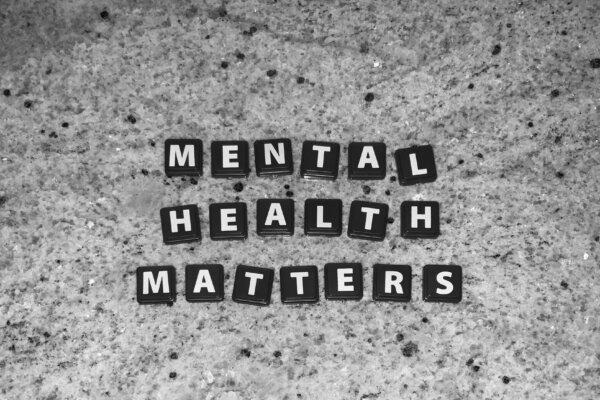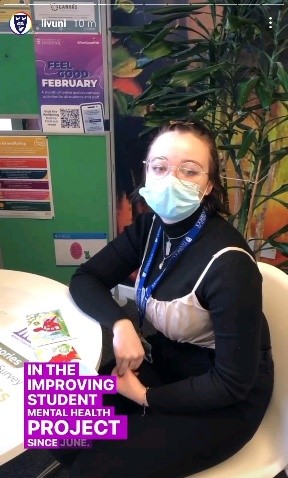6th November 2023
Listen
Listen

Over the past year, University of Liverpool students have been working on a campaign for student mental health. The ‘Improving Mental Health Through Partnerships Project’ is an Office for Students funded partnership; between The University of Liverpool, Liverpool John Moores University, Mersey Care NHS Foundation Trust and others. To encourage co-production, the project hired 5 Student Content Creators to produce digital content, consult on project activities and increase engagement with students.
Since June 2021, the team has: consulted on topics for project workshops; designed Wellbeing Walls, found in Sydney Jones and Harold Cohen libraries; and consulted on the scripts, featuring in photographs and creating voice recordings for the Zero Suicide Alliance Student Module.
I caught up with two team members, to ask about their experiences taking part. Bethan holds the position of Chair and Nujhat is a Content Creator.
Bethan: I’m studying Psychology and I’m in my second year!
Nujhat: I am studying Law and am in my third and final year.
Bethan: I’ve struggled with my own mental health for years, so it’s definitely a cause close to my heart! It was only recently I was able to access support. So, I’m very passionate about making support and awareness as widespread and accessible as possible. My mental health was also always a massive barrier to me finding employment, so this project was brilliant for me to get some experience working in a supportive environment alongside people with similar experiences.
Nujhat: I decided to get involved in the project due to having suffered from mental health issues myself. I wanted to be part of a project that could raise awareness and reach people on a larger scale, to maximise the impact of available resources. I wanted to create a simple but effective platform that would help signpost students to the right resources.
Bethan: I am part of the Student Content Creators and the acting Chair for the team. I create social media content, blog posts and take part in projects such as the Zero Suicide Alliance training module where I modelled for photos and recorded voice-overs. I was also involved in the designing and development of the Wellbeing Walls, which are now installed around the University. As Chair, I also help to plan and run team meetings as well as plan future content. I have enjoyed all the fun and varied experiences I have been able to get involved with.
Nujhat: My role within the project is mainly content creation. This may include creating posts for the University’s website. I helped create the Wellbeing Wall, which can be found in both libraries. I also created banners for the University’s wellbeing workshops. Furthermore, I have been involved in the ZSA training module by doing a voice-over acting role.
Bethan: The social media takeover! To promote our Wellbeing Walls in the Sydney Jones and Harold Cohen libraries, we were able to make social media content and talk about the project on the University of Liverpool‘s Instagram account. We were also able to promote the postcard hunt, part of Feel Good February, where prize-winning postcards were hidden around the university. The postcards contained the artwork commissioned for the Wellbeing Wall. It was kind of terrifying scrolling through Instagram stories and seeing your own face on an account with so many followers but it was amazing to be able to reach so many people. We have also had the Wellbeing Walls posted on the Library’s social media accounts which is so amazing to see as we worked on this aspect of the project for a while.

Nujhat: My favourite thing was creating the Wellbeing Wall, which allowed us to be creative and come up with our own ideas. I also enjoyed taking part in the ZSA training module. Taking part in recording the voiceovers was very different to anything I have done before.

Bethan: I’m still learning to help my own mental health, so this is definitely a work in progress but I love to draw and paint! I find oil painting so satisfying and calming (even when it doesn’t go great). I also listen to a ton of podcasts, while playing PC games to unwind.
Nujhat: I like to take some time off for myself. This allows me to relax and re-energise by doing activities that I enjoy, like taking a long walk or going for a run. I also enjoy just sitting at home, watching a movie, and treating myself to good food, which always cheers me up. It is important to do what works for you!
Bethan: Ideally, I would love a student-led initiative to continue with a focus on raising awareness around mental health and the support available at the University. It is something I am really interested in seeing through. I think it would be amazing to see more peer support groups, for example in the Psychology department and for students with disabilities (including mental health conditions). These groups are a great opportunity to get together and discuss any struggles, successes and coping strategies. I think it would be great for more students to get to get involved in similar groups.
Nujhat: I would like if a new pool of students were able to continue this work in the next academic year. It would also be great if the Wellbeing Walls can be recreated in more university buildings. It would be amazing if this can be expanded through social media channels. I would just love for students to continue raising awareness and helping others that are struggling with mental health.
Bethan: I think it’s great for it to be student-led! It really tunes into the current attitudes and barriers students have to mental health support. Hearing other students talk honestly and openly about their mental health struggles can be a massive help. I know it is something that has helped me be more open about my experiences. In the case of the ZSA suicide training, our experiences as students were essential to its development. We consulted on the scripts, which ensured the training was relatable to students. I think as a student it is easier to identify services and areas which need improvements or more awareness.
Nujhat: I do believe that the content being led by students for students helps. I think it creates better content as well as engagement. Specifically, because students will be able to relate to similar struggles. Students will also understand better how to communicate or present content in an effective manner.
If mental health issues are affecting you or a friend, support is available; whether it’s talking to professionals or confiding in those close to you. The Content Creator team compiled a list of resources, signposting to support.
Students experiencing complex and/or significant mental health difficulties can contact the Mental Health Advisory Service. The University also has its own Counselling Service, which provides confidential psychological therapy. Both the Mental Health Advisory Service and Counselling Service are accessible by first making an appointment with the Wellbeing Team via The Hub, phoning 0151 795 1000 or emailing advice@liverpool.ac.uk.
Students can also access Health Assured, which offers a free, confidential advice line. Call the 24/7 helpline for free on 0800 028 3766. Download the app from Google Play or the App Store.
If you’re ill, you can contact your GP, a Walk-In Centre or a pharmacy. Information and advice about NHS services is available online. If you need help now but it’s not an emergency, visit the 111 website or call 111.
Featured Photo by Marcel Strauß on Unsplash